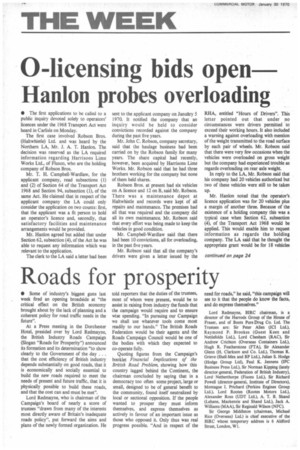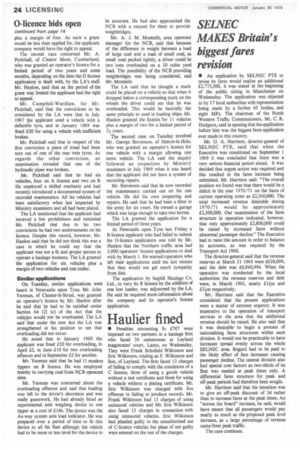0-licensing bids open
Page 16

Page 26

If you've noticed an error in this article please click here to report it so we can fix it.
Hanlon probes overloading
ID The first applications to be called to a public inquiry devoted solely to operators' licences under the 1968 Transport Act were heard in Carlisle on Monday.
The first case involved Robson Bros. (Haltwhistie) Ltd. and was heard by the Northern LA, Mr. J. A. T. Hanlon. The decision was reserved as the LA required information regarding Harrisons Lime Works Ltd., of Flusco, who are the holding company of Robson Bros.
Mr. T. H. Campbell-Wardlaw, for the applicant company, read subsections (I) and (2) of Section 64 of the Transport Act 1968 and Section 94, subsection (1), of the same Act. He claimed that in respect of the applicant company the LA could only consider the application on two counts: first, that the applicant was a fit person to hold an operator's licence and, secondly, that satisfactory facilities and maintenance arrangements would be provided.
Mr. Hanlon agreed but added that under Section 62, subsection (4), of the Act he was able to request any information which was relevant to the application.
The clerk to the LA said a letter had been sent to the applicant company on January 5 1970. It notified the company that an inquiry would be held to consider convictions recorded against the company during the past five years.
Mr. John C. Robson, company secretary, said that the haulage business had been carried on by the Robson family for many years. The share capital had recently, however, been acquired by Harrisons Lime Works. Mr. Robson said that he had three brothers working for the company but none of them held shares.
Robson Bros. at present had six vehicles on A licence and 12 on B, said Mr. Robson. There was a maintenance depot at Haltwhistle and records were kept of all repairs and maintenance. The premises had all that was required and the company did all its own maintenance. Mr. Robson said that every effort was being made to keep the vehicles in good condition.
Mr. Campbell-Wardlaw said that there had been 10 convictions, all for overloading, in the past five years.
Mr. Robson said that all the company's drivers were given a letter issued by the FtHA, entitled "Hours of Drivers". This letter pointed out that under no circumstances were drivers permitted to exceed their working hours. It also included a warning against overloading with mention of the weight transmitted to the road surface by each pair of wheels, Mr. Robson said that there were very few occasions when the vehicles were overloaded on gross weight but the company had experienced trouble as regards overloading on rear axle weight.
In reply to the LA, Mr. Robson said that his company had 20 vehicles authorized but two of these vehicles were still to be taken up.
Mr. Hanlon noted that the operator's licence application was for 20 vehicles plus a margin of another three. Because of the existence of a holding company this was a typical case when Section 62, subsection (4), of the Transport Act 1968 would be applied. This would enable him to request information as regards the holding company. The LA said that he thought the appropriate grant would be for 18 vehicles plus a margin of four. As such a grant would be less than applied for, the applicant company would have the right to appeal.
The second case concerned Mr. A. Pickthall, of Cleator Moor, Cumberland, who was granted an operator's licence for a limited period of two years and some months, depending on the date the 0 licence application is dealt with, by the LA's staff. Mr. Hanlon, said that as the period of the grant was limited the applicant had the right to appeal.
Mr. Campbell-Wardlaw, for Mr. Pickthall, said that the convictions to be considered by the LA were that in July 1967 tbe applicant used a vehicle with a defective tyre, and in January 1969 was fined £20 for using a vehicle with inefficient brakes.
Mr. Pickthall said that in respect of the first conviction a piece of tread had been torn out of one of the rear twin tyres. As regards the other conviction, an examination revealed that one of the hydraulic pipes was broken.
Mr. Pickthall said that he had six vehicles, four on A licence and two on B. He employed a skilled mechanic and had recently introduced a documented system of recorded maintenance. All his vehicles had been satisfactory when last inspected by Ministry examiners and all had been plated.
The LA mentioned that the applicant had received a few prohibitions and reminded Mr. Pickthall that due to his two convictions he had two endorsements on his licence. Despite this record, however, Mr. Hanlon said that he did not think this was a case in which he could say that the applicant was not a fit and proper person to operate a haulage business. The LA granted the application for six vehicles plus a margin of two vehicles and one trailer.
Similar applications On Tuesday, similar applications were heard in Newcastle upon Tyne. Mr. John Yeoman, of Chester-le-Street, was granted an operator's licence by Mr. Hanlon after he said that he had to be satisfied under Section 64 (2) (c) of the Act that the vehicles would not be overloaded. The LA said that under the new Act the LA was strengthened in his position to see that overloading did not occur.
He noted that in January 1968 the applicant was fined £20 for overloading, in April £2, in June £10 for two overloading offences and in September £5 for another.
Mr. Yeoman said that he had 11 modern tippers on B licence. He was employed mainly in carrying coal from NCB opencast sites.
Mr. Yeoman was concerned about the overloading offences and said that loading was left to the driver's discretion and was really guesswork. He had already fitted an experimental axle weighing device to one tipper at a cost of £146. The clevice was the Ax-way system axle load indicator. He was prepared over a period of time to fit .this device to all his fleet although the vehicle Had to be more or less level for the device to be accurate. He had also approached the NCB with a request for them to provide weighbridges.
Mr. A. J. M. Monteith, area opencast manager for the NCB, said that because of the difference in weight between a load of large coal and a load of small coal, as small coal packed tightly, a driver could be two tons overloaded on a 10 cubic yard load. The possibility of the NCB providing weighbridges was being considered, said Mr. Monteith.
The LA said that he thought a mark could be placed on a vehicle so that when it dropped below a corresponding mark on the wheels the driver could see that he was overloaded. This would be basically the same principle as used in loading ships. Mr. Hanlon granted the licenbe for 11 vehicles plus a margin of two for a limited period of 21 years.
The second case on Tuesday involved Mr. George Stevenson, of Hetton-le-Hole, who was granted an operator's licence for one vehicle with a margin allowing one more vehicle. The LA said the inquiry followed an inspection by Ministry examiners in July 1969 when it was heard that the applicant did not have a system of recording repairs.
Mr. Stevenson said that he now recorded the maintenance carried out on his one vehicle. He did his own inspecting and repairs. He said that he had been a fitter in the army for six years. He owned a garage which was large enough to take two lorries.
The LA granted the application for a limited period of three years.
At Newcastle upon Tyne last Friday a B-licence applicant who had failed to submit his 0-licence application was told by Mr. Hanlon that the Northern traffic area had 3,000 operators' licence applications to deal with by March 1. He warned operators who left their applications until the last minute that they would not get much sympathy from him.
The application by Seghill Haulage Co. Ltd., to vary its B licence by the addition of one low loader, was adjourned by the LA. He said he required more information about the company and its operator's licence application.






























































































